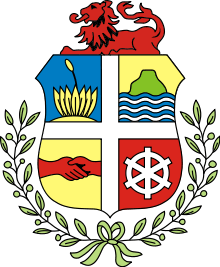Politics of Aruba
 |
|---|
| This article is part of a series on the politics and government of Aruba |
Aruba, a constituent country of the Kingdom of the Netherlands, takes place in a framework of a parliamentary representative democratic country, whereby the prime minister is the head of government, and of a multi-party system. Executive power is exercised by the government. Federal legislative power is vested in both the government and parliament. The Judiciary is independent of the executive and the legislature. Aruba has full autonomy on most matters. Exceptions are defence, foreign affairs, and the Supreme Court. The constitution was enacted in January 1986.
Executive power rests with a governor, and a prime minister heads an eight-member Cabinet. The governor of Aruba is appointed for a six-year term by the monarch, and the prime minister and deputy prime minister are elected by the Staten (legislature) for four-year terms. The Staten is made up of 21 members elected by direct, popular vote to serve four-year terms.
Aruba's judicial system, which has mainly been derived from the Dutch system, operates independently of the legislature and the executive. Jurisdiction, including appeal, lies with the Common Court of Justice of Aruba and the Netherlands Antilles and the Supreme Court of Justice in the Netherlands.